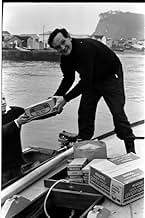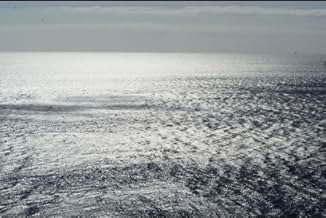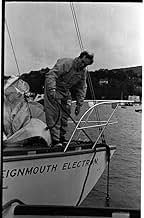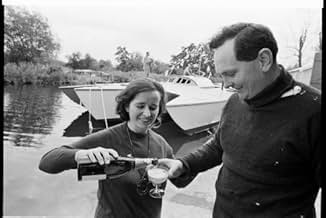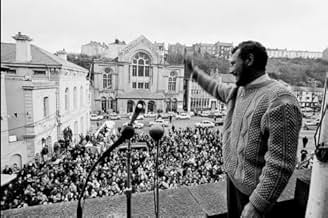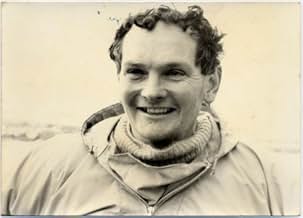ÉVALUATION IMDb
7,8/10
3,4 k
MA NOTE
Ajouter une intrigue dans votre langueA documentary about the disastrous 1968 round-the-world yacht race.A documentary about the disastrous 1968 round-the-world yacht race.A documentary about the disastrous 1968 round-the-world yacht race.
- Prix
- 4 victoires et 2 nominations au total
Tilda Swinton
- Self - Narrator
- (voice)
Donald Crowhurst
- Self - Golden Globe Race Competitor
- (archive footage)
Santiago Franchessi
- Self - Former Coastguard, Rio Salado
- (as Santiago Franchessie)
Jean Badin
- Bernard Moitessier
- (voice)
Stanley Best
- Self - Donald Crowhurst's Financier
- (archive footage)
Chay Blyth
- Self - Golden Globe Race Competitor
- (credit only)
Alex Carozzo
- Self - Golden Globe Race Competitor
- (archive footage)
Francis Chichester
- Self - July 1967, Francis Chichester Knighted
- (archive footage)
Loïck Fougeron
- Self - Golden Globe Race Competitor
- (credit only)
Rodney Hallworth
- Self - Donald Crowhurst's Public Relations Officer
- (archive footage)
Avis en vedette
10seshy
This is an account of events that have been covered in print several times, and I had read two books - 'A Voyage for Madmen' and 'The Strange Last Voyage of Donald Crowhurst' before seeing the film in Sheffield just before Christmas. I must say, it exceeded all expectations in its telling of the 1968 Sunday Times Golden Globe yacht race. These men set out to do something that had never been done before with no support vessels, wooden boats, no satellite phones, no GPS, and just their wits and skill to get them round the globe in one piece. Not to mention the months of solitude, the thundering southern ocean, little sleep, and boats that were often literally falling apart around them.
This documentary is excellently put together in my opinion, tightly edited, well paced with superb narration. The archive footage and the interviews are fascinating and bring the story to life. Clare Crowhurst's interview footage is especially revealing and moving as she relates the events that led up to her husband, Donald Crowhurst's departure from Teignmouth, the doubts and fears in his mind and her reaction as subsequent events unfolded.
I was moved and had even shed a tear or two by the time the credits started rolling, and overheard other people expressing similar feelings.
The two books I mentioned above are useful for more detail and back-story which couldn't have been fitted into the 90 minutes and I would recommend those too.
This is ultimately a true story of human courage and human frailty. A must see for anyone interested in sailing, adventure, human endeavour and real-life heroes.
This documentary is excellently put together in my opinion, tightly edited, well paced with superb narration. The archive footage and the interviews are fascinating and bring the story to life. Clare Crowhurst's interview footage is especially revealing and moving as she relates the events that led up to her husband, Donald Crowhurst's departure from Teignmouth, the doubts and fears in his mind and her reaction as subsequent events unfolded.
I was moved and had even shed a tear or two by the time the credits started rolling, and overheard other people expressing similar feelings.
The two books I mentioned above are useful for more detail and back-story which couldn't have been fitted into the 90 minutes and I would recommend those too.
This is ultimately a true story of human courage and human frailty. A must see for anyone interested in sailing, adventure, human endeavour and real-life heroes.
Deep Water (2006) ****
"It is indifferent... it's there waiting for you to make one slip up." Those words (paraphrased) are perhaps the best sum up of the nature of the ocean I have ever heard muttered. Its furies are boundless, not least of which, her loneliness. Those words come from the mesmerizing and heartbreaking documentary Deep Water. It is the story of Donald Crowhurst, an amateur sailor who partook in the 1969 Sunday Times Race around the World. If you do not know his story, it may be best to stop reading now. Don't read this or any other information on Crowhurst or the race. Find the film and just watch it.
After the first solo circumnavigation of the ocean in 1967, adventurers and watchers of adventurers began seeking the next one-up. This time the journey would have to be done without making landfall or stopping along the way. Having fallen on hard times, Crowhurst saw the race as a great chance to get his family back on their feet. He had lived through financial hardships as a child, and wanted part in going back to such a life. So he set out to find sponsors, and soon did in Stanley Best and Rodney Hallworth. The two men spelled the potential cash cow, and granted Crowhurst a boat, on the condition that if he should pull out of the race he would be forced himself to pay the expenses. His boat however was in serious need of repairs, and he feared it would not be ready in time for the final departure day. He was informed however by his sponsor's that he simply must go after all, they ponied up the dough and expected it back many a time over.
The details of the story are infamous: Crowhurst's boat began taking on water, and his progress slowed to a crawl. Faced with the decision of trying to round the horn of Africa (certain death in such a boat) or turn back (financial devastation and destitution), he searched for a third option. He chose to hide out, alone on his yacht, waiting for other competitors to round Cape Horn in South America. From there he would rejoin the race. He reported false positions, and record breaking speeds. Then he stopped all communication for fear that his position would be given away. He also had to painstakingly construct fake log books for each day of a journey he did not take. Eventually the loneliness, the guilt, and the realization that he would likely be caught weighed too heavy on Crowhurst. His final log entries make the musings of a Kurtz seem entirely sane. Only a few weeks from home, he turned his boat away from home, and is reported to have jumped overboard soon thereafter.
Crowhurst's odyssey is a fascinating one, and its ending is heartbreaking, but strikes of inevitability. Our dreams so often turn into fears, and the consequences of our actions often leave us so few options for a happy ending. It is a story of a descent into madness, teased on by the infinite abyss of the cruel seas. The filmmakers do a wonderful job in telling this story. It's put together with chilling audio and video recordings done by Crowhurst, and narrations of his ever-increasingly maddening log notes. The story starts slowly, and may distract some viewers, but the rewards of the story are entirely worthwhile as it progresses.
There are also inquiries into some of the other competitors, such as Frenchman Bernard Moitessier, who was on par to likely win the speed competition, only to pull out and begin a second trip around the world. Also in the film is Robin Knox-Johnston, who was the winner of the competition. He donated his prize money to the Crowhurst family.
To read briefly on the Crowhurst saga simply does not do justice. It's interesting of course, but a quick browse bypasses the raw emotions and oddness presented here. The final moments of Deep Water are genuinely heart breaking, hearing the thoughts of his widowed family, and the adoration and understanding of his friends. This is a fascinating story, and it is that which carries the documentary into such great channels.
"It is indifferent... it's there waiting for you to make one slip up." Those words (paraphrased) are perhaps the best sum up of the nature of the ocean I have ever heard muttered. Its furies are boundless, not least of which, her loneliness. Those words come from the mesmerizing and heartbreaking documentary Deep Water. It is the story of Donald Crowhurst, an amateur sailor who partook in the 1969 Sunday Times Race around the World. If you do not know his story, it may be best to stop reading now. Don't read this or any other information on Crowhurst or the race. Find the film and just watch it.
After the first solo circumnavigation of the ocean in 1967, adventurers and watchers of adventurers began seeking the next one-up. This time the journey would have to be done without making landfall or stopping along the way. Having fallen on hard times, Crowhurst saw the race as a great chance to get his family back on their feet. He had lived through financial hardships as a child, and wanted part in going back to such a life. So he set out to find sponsors, and soon did in Stanley Best and Rodney Hallworth. The two men spelled the potential cash cow, and granted Crowhurst a boat, on the condition that if he should pull out of the race he would be forced himself to pay the expenses. His boat however was in serious need of repairs, and he feared it would not be ready in time for the final departure day. He was informed however by his sponsor's that he simply must go after all, they ponied up the dough and expected it back many a time over.
The details of the story are infamous: Crowhurst's boat began taking on water, and his progress slowed to a crawl. Faced with the decision of trying to round the horn of Africa (certain death in such a boat) or turn back (financial devastation and destitution), he searched for a third option. He chose to hide out, alone on his yacht, waiting for other competitors to round Cape Horn in South America. From there he would rejoin the race. He reported false positions, and record breaking speeds. Then he stopped all communication for fear that his position would be given away. He also had to painstakingly construct fake log books for each day of a journey he did not take. Eventually the loneliness, the guilt, and the realization that he would likely be caught weighed too heavy on Crowhurst. His final log entries make the musings of a Kurtz seem entirely sane. Only a few weeks from home, he turned his boat away from home, and is reported to have jumped overboard soon thereafter.
Crowhurst's odyssey is a fascinating one, and its ending is heartbreaking, but strikes of inevitability. Our dreams so often turn into fears, and the consequences of our actions often leave us so few options for a happy ending. It is a story of a descent into madness, teased on by the infinite abyss of the cruel seas. The filmmakers do a wonderful job in telling this story. It's put together with chilling audio and video recordings done by Crowhurst, and narrations of his ever-increasingly maddening log notes. The story starts slowly, and may distract some viewers, but the rewards of the story are entirely worthwhile as it progresses.
There are also inquiries into some of the other competitors, such as Frenchman Bernard Moitessier, who was on par to likely win the speed competition, only to pull out and begin a second trip around the world. Also in the film is Robin Knox-Johnston, who was the winner of the competition. He donated his prize money to the Crowhurst family.
To read briefly on the Crowhurst saga simply does not do justice. It's interesting of course, but a quick browse bypasses the raw emotions and oddness presented here. The final moments of Deep Water are genuinely heart breaking, hearing the thoughts of his widowed family, and the adoration and understanding of his friends. This is a fascinating story, and it is that which carries the documentary into such great channels.
I happened upon this by chance. I was at my friends house and he had just started watching it, so I sat down thinking we would shoot the breeze whilst this was playing in the background. However, within seconds I was immersed in this docu-drama, and we both spent the rest of the time completely focused on this and not saying a word to each other.
I never knew the tale of the the first solo around the world yacht race, let alone the tragic events of one man's attempt against the odds, which set out to be his redemption for all of his misfortunes in life, but ultimately ends up becoming an example of them. Having not known of the story, I did watch this with the same fervor as I imagine those who were reading about the race at the time it actually was happening, engulfed in what was taking place and eager for more information, hoping the lone amateur was going to pull it off against the odds and beat the pro's, which makes the shocking twists of the story all the more tragic, I felt like I was living the story.
The story is told with great care, and the interviewees have clearly had time to reflect on the tragedy, which gives great insights, but is also contrasted nicely by the archive footage of interviews at the time of the tragedy, the recordings and photographs of the lone sailors is also excellently used, and the insights into the minds of the sailors and how solitude was affecting them was superb.
I'm shocked that this story isn't more widely known or has been turned into a movie, but also thankful. Thankful that we have this drama-documentary to tell the tale from those who knew the man, instead of some wishy-washy movie adaptation, and thankful that I caught this gem of a film by pure chance.
It's a must see, whether you like documentaries or not.
I never knew the tale of the the first solo around the world yacht race, let alone the tragic events of one man's attempt against the odds, which set out to be his redemption for all of his misfortunes in life, but ultimately ends up becoming an example of them. Having not known of the story, I did watch this with the same fervor as I imagine those who were reading about the race at the time it actually was happening, engulfed in what was taking place and eager for more information, hoping the lone amateur was going to pull it off against the odds and beat the pro's, which makes the shocking twists of the story all the more tragic, I felt like I was living the story.
The story is told with great care, and the interviewees have clearly had time to reflect on the tragedy, which gives great insights, but is also contrasted nicely by the archive footage of interviews at the time of the tragedy, the recordings and photographs of the lone sailors is also excellently used, and the insights into the minds of the sailors and how solitude was affecting them was superb.
I'm shocked that this story isn't more widely known or has been turned into a movie, but also thankful. Thankful that we have this drama-documentary to tell the tale from those who knew the man, instead of some wishy-washy movie adaptation, and thankful that I caught this gem of a film by pure chance.
It's a must see, whether you like documentaries or not.
Some of the most difficult journeys are the ones we make alone. Totally alone. Donald Crowhurst's journey was made before satellite positioning. When he sails over the horizon he is, in effect, alone with the universe. His mission: to be the first or the fastest to sail around the world non-stop.
"We are all human beings and we all have dreams." Such are the first words of Deep Water. The sea of troubles that Crowhurst encounters are more than just physical. In this spellbinding documentary, we see the daunting adventure that he and some of the other competitors undertake. We experience the different ways they come to grips with intimidating loneliness and horrifying psychological pressures.
Personally, I can't swim. I don't particularly like water and my Kiwi friends make fun of me. But even the waves of the best made Hollywood pictures come with a comfort zone of music, reassuring dialogue or other reminders that it is 'all pretend'. Not so with Deep Water. Bleak opening credits leave us in no doubt of the cruel and relentless nature of the sea - the physical and also the mental challenge. A friend of mine, a few years ago, sailed around the world with a very small group of other people, all experienced yachtsmen. When she came back, it was several years before she was herself again.
Deep Water starts in 1967. Francis Chichester has just circumnavigated the globe on his own, but with a brief stop in Sydney. The Sunday Times announces a competition for sailing single-handedly around the world non-stop. Crowhurst enters, with not only glory but the financial fortunes of his family at stake (having mortgaged his house). But as his wife says, "There is a moment when an opportunity arises - and if you don't grasp it, that's that." They are noticeably worried about the outcome. Last minute preparations are been rushed. Later we will find only one of the original nine final contestants ever returns.
Bernard Moitessier, within reach of the end and possible victory after six months alone at sea, discovers he has found peace in the vast loneliness. He changes course to begin a second circuit. Something inside him changes. Something changes inside Crowhurst too, but for him the inner journey is far more turbulent.
Deep Water, beautifully narrated by Tilda Swinton, is a moving and totally absorbing account of one man who gets in over his head both physically and morally. The small boat becomes a microcosm for life where a person has to find their own rules. Crowhurst's journey is not the journey of Sunday Times heroes, but of a man. His dilemma is dangerously easy to identify with. This is an incredibly moving story - if you don't already know the historical details, do see the film first.
"We are all human beings and we all have dreams." Such are the first words of Deep Water. The sea of troubles that Crowhurst encounters are more than just physical. In this spellbinding documentary, we see the daunting adventure that he and some of the other competitors undertake. We experience the different ways they come to grips with intimidating loneliness and horrifying psychological pressures.
Personally, I can't swim. I don't particularly like water and my Kiwi friends make fun of me. But even the waves of the best made Hollywood pictures come with a comfort zone of music, reassuring dialogue or other reminders that it is 'all pretend'. Not so with Deep Water. Bleak opening credits leave us in no doubt of the cruel and relentless nature of the sea - the physical and also the mental challenge. A friend of mine, a few years ago, sailed around the world with a very small group of other people, all experienced yachtsmen. When she came back, it was several years before she was herself again.
Deep Water starts in 1967. Francis Chichester has just circumnavigated the globe on his own, but with a brief stop in Sydney. The Sunday Times announces a competition for sailing single-handedly around the world non-stop. Crowhurst enters, with not only glory but the financial fortunes of his family at stake (having mortgaged his house). But as his wife says, "There is a moment when an opportunity arises - and if you don't grasp it, that's that." They are noticeably worried about the outcome. Last minute preparations are been rushed. Later we will find only one of the original nine final contestants ever returns.
Bernard Moitessier, within reach of the end and possible victory after six months alone at sea, discovers he has found peace in the vast loneliness. He changes course to begin a second circuit. Something inside him changes. Something changes inside Crowhurst too, but for him the inner journey is far more turbulent.
Deep Water, beautifully narrated by Tilda Swinton, is a moving and totally absorbing account of one man who gets in over his head both physically and morally. The small boat becomes a microcosm for life where a person has to find their own rules. Crowhurst's journey is not the journey of Sunday Times heroes, but of a man. His dilemma is dangerously easy to identify with. This is an incredibly moving story - if you don't already know the historical details, do see the film first.
This is a gem. As a Film Four production - the anticipated quality was indeed delivered. Shot with great style that reminded me some Errol Morris films, well arranged and simply gripping. It's long yet horrifying to the point it's excruciating. We know something bad happened (one can guess by the lack of participation of a person in the interviews) but we are compelled to see it, a bit like a car accident in slow motion. The story spans most conceivable aspects and unlike some documentaries did not try and refrain from showing the grimmer sides of the stories, as also dealing with the guilt of the people Don left behind him, wondering why they didn't stop him in time. It took me a few hours to get out of the melancholy that gripped me after seeing this very-well made documentary.
Le saviez-vous
- AnecdotesThe movie Le jour de mon retour (2018) focuses on the story and race of Donald Crowhurst (played by Colin Firth)
- Citations
Self - Crowhurst's Closest Friend: I think doubt started to set in... when reality started to set in. And that reality wasn't quite as perfect as the idea. This is why ideas are dangerous.
- ConnexionsEdited into Independent Lens: Deep Water (2008)
Meilleurs choix
Connectez-vous pour évaluer et surveiller les recommandations personnalisées
- How long is Deep Water?Propulsé par Alexa
Détails
- Date de sortie
- Pays d’origine
- Sites officiels
- Langue
- Aussi connu sous le nom de
- Глубокие воды
- Lieux de tournage
- sociétés de production
- Consultez plus de crédits d'entreprise sur IMDbPro
Box-office
- Brut – États-Unis et Canada
- 271 143 $ US
- Fin de semaine d'ouverture – États-Unis et Canada
- 22 632 $ US
- 26 août 2007
- Brut – à l'échelle mondiale
- 742 576 $ US
- Durée1 heure 33 minutes
- Couleur
- Mixage
- Rapport de forme
- 1.85 : 1
Contribuer à cette page
Suggérer une modification ou ajouter du contenu manquant

Lacune principale
By what name was Deep Water (2006) officially released in India in English?
Répondre

